User Ideas / Prospects
.jpeg)
Biomedical Engineering is a rapidly emerging career in India. And you use engineering and medical science to develop new healthcare solutions. If you want to have a career that makes a tangible impact on the world this is a very solid field. Now, let us take a look at the biomedical engineer salary, career path and Education needed to be a biomedical engineer in India.
What Is Biomedical Engineering?
Biomedical engineering is the application concerned with the design and development of medical devices. Assist in diagnosing, treating, and preventing diseases Engineers in this field collaborate with doctors, researchers, and manufacturers to create better healthcare technology.
Biomedical Engineer Education Requirements:
In order to become a biomedical engineer in India, you need appropriate education. Here’s what you should study:
Undergraduate Degree
The most common degree used for such courses is BE/B.Tech in Biomedical Engineering. Some opt for related fields, such as electronics or biotechnology. The students are admitted into the top colleges of the country through entrance exams such as JEE Main, JEE Advanced, and the state level entrance exams.
Postgraduate Studies
You can specialize with an M.Tech or M.E. in Biomedical Engineering colleges . A large number of students study MBA in Healthcare Management to get into Managerial jobs. Some also go for Ph. D. programs if they plan to pursue a research career.
Additional Certifications
Certification and short biomedical engineering courses enhance employment opportunities. It helps, e.g., taking courses in medical imaging or artificial organs or bioinformatics. Online platforms, however, also other institutions like Engineers Heaven provide learning material and certificate courses.
Typical Job Choices for Biomedical Engineers:
Biomedical engineering jobs can be numerous with a degree. Engineers work with hospitals, research centers, or industries.
Manufacturing of Medical Equipment
Medical devices are made by many companies and many biomedical engineers work for such companies. They also design devices such as MRI scanners, prosthetic limbs and heart monitors. Some of the Major Companies in India are Philips Healthcare, GE Healthcare, Siemens Healthineers.
Healthcare IT and Software
Biomedical engineers also work with healthcare software companies. Hospital management systems, AI-based diagnosis tools, telemedicine solutions. They get hired by companies such as Tata Consultancy Services (TCS) and Infosys.
Clinical Engineering
There is a need for the maintenance of medical equipment in hospitals, and this is where biomedical engineers come into the picture. They make sure devices such as ventilators and dialysis machines function properly. This role is significant in both private and government hospital.
Research & Development (R&D)
A lot of engineers do research institutes. They are used to develop new medical technologies, drug delivery systems, and bioelectronics. Research and Development opportunities are available with organizations like IITs, AIIMS, CSIR.
Entrepreneurship and Startups
Most biomedical engineers launch their own healthcare technology companies. Innovations in medical devices, wearable health tech, AI-driven diagnostics — those have massive potential. Companies like CureMetrix and HealthifyMe have found a market in this segment.
Biomedical Engineers Salary in India
Experience and skills will also affect salary and location. So, now let us see what are the biomedical Engineering Salary in India.
- Entry-Level Salary
5 lakh per annum are earned by fresh graduates. The metal cities get better salary jobs.
- Mid-Level Salary
3-5 years of experience: ₹6 to ₹10 lakh per year. Domain specialization, such as biomechanics or bioinformatics, is valuable and increases salary.
- Senior-Level Salary
Senior engineers (10+ yr experience): ₹12 to ₹20 lakh per annum Well-remunerated senior roles in research, management, and product development.
Top-Paying Companies
Medtronic, Johnson & Johnson — as well as GE Healthcare — have the best packages. The government research jobs also offer secure salaries.
Why is Biomedical Engineering important?
- High Demand
It will take longer than a few decades to fix the healthcare industry. Biomedical engineers are in demand in hospitals, research labs, and medical device companies.
- Innovation and Impact
Biomedical engineers develop life-saving technology. They make the quality of care better for millions of people.
- Diverse Career Paths
Opportunities in engineering, software development, research, and business are possible in this field. Engineers also work on robotics, prosthetics and nanotechnology.
How to Make a Career in Biomedical Engineering?
- Choose the Right College
Career opportunities are enhanced with a degree acquired from a top engineering institute. Good programs are offered by IITs, NITs, and private universities like Manipal Institute of Technology.
- Gain Practical Experience
Internships and projects definitely increases placement. Gain Real World Skills by working with hospitals, research labs, and biotech companies
- Develop Technical Skills
Very useful to know AI, programming and medical imaging software. Engineers Heaven courses assist in developing technical knowledge.
- Network and Stay Updated
Keep up with industry: Attend seminars, workshops, and other industry-related events to broaden your horizon and expand your network. For engineers to stay relevant and cut through the noise, they need to keep up with healthcare trends and the new technologies that follow.
Final Thoughts
What are the scopes in Biomedical engineering in India? It has nice salaries, exciting paths of career advancement and ways to improve health care. This field has something for everyone whether you want to work in research, manufacturing, or healthcare IT.
Engineers Heaven, if you are seeking help, niche or resources's knowledge. We help students grow successful careers with expert advice and Insights. Want to know more, Sign up with us and start your knowledge biomedical engineering journey today!
(Disclaimer: This statistics could be different in different part of World and Different timeline. this statistics has been generated based on data available till 2025 or relavant time span.)
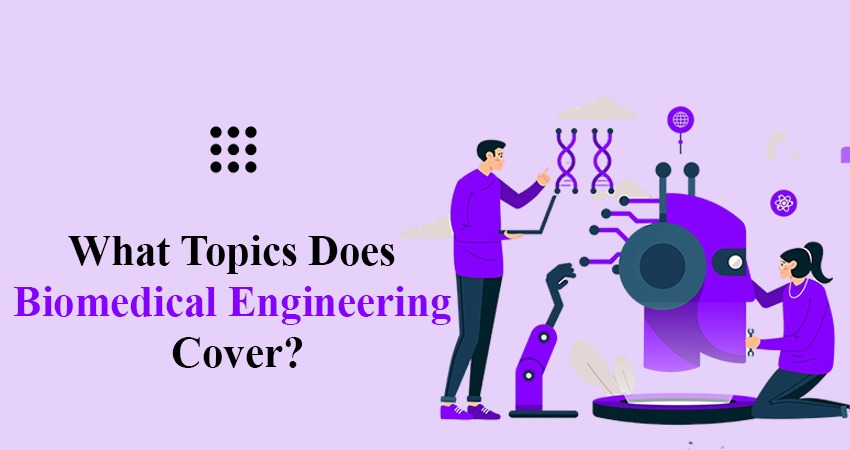
Biomedical engineering is a broad and exciting field. It combines the principles of engineering with the medical sciences to enhance healthcare. It is critically important in modern medicine, from advanced prosthetics to life-saving imaging systems.
Overview of Biomedical Engineering
If you are someone who is looking to enter the field of biomedical engineering and enjoy all facets of mechanical engineering and medicine, then Engineer's Heaven hopes to help you navigate the new and dynamic world of biomedical engineering! This blog aims at providing you with the core concepts included in this area.
Personalized medicine, genomics, and gene therapy
Medical imaging is one of the most vital aspects of biomedical engineering. Imaging techniques such as MRI, CT scans, and ultrasound assist healthcare providers in the accurate diagnosis of illnesses. It is heavily based on physics, signal processing, and artificial intelligence to generate clear medical images.
They are also biomedical engineers who help enhance imaging quality, minimize radiation hazards, and increase device efficiency. Modern medicine would face tremendous challenges regarding early disease detection without these innovations.
Prosthetics and Bionics
Thousands have revolutionized hundreds of millions of lives with prosthetic limbs and bionic implants. Scientists create prosthetic limbs that closely replicate natural movement. A few even link to the nervous system, giving users the ability to control using their thoughts.
Bionics go beyond limbs. Some of these implants serve the blind (retinal implants), and others restore hearing (cochlear implants). These technologies are being updated and secured by biomedical engineers, making them more effective and available.
Tissue Engineering and Biomaterials
The human body is complicated, and even replacing damaged tissues is a huge hurdle. This is why there are biomaterials and tissue engineering—scientists design materials happy in your body that can be used as artificial skin, bone grafts, or heart valves, for example. That would be tissue engineering. Stem cells can be used to grow human tissues in laboratories. Hopefully the next step would be growing whole organs to avoid the need for organ transplantation. The field is at the forefront of medical innovation.
Med Devices and Wearable Tech.
Biomedical engineers create medical equipment that facilitates treatment and patient monitoring. Trainable examples include pacemakers, insulin pumps, and dialysis machines. These devices treat chronic diseases and improve patient outcomes.
The field of wearables is another burgeoning one. Smartwatches and fitness trackers measure heart rate, oxygen levels, and, increasingly, early signs of disease. Engineers are trying to make these devices more accurate and reliable.
Biomechanics & Rehabilitation Engineering
Biomechanics deals with the movement and function of the body. Engineers study how things move and use this information to create solutions for people who struggle with mobility. Rehabilitation engineering develops assistive technologies, such as robotic exoskeletons and ergonomic chairs.
These advances are assisting stroke patients in recovering movement and enhancing the quality of life for people with disabilities. This field is expanding the realm of the possible by combining engineering with human biology.
Scientists are also considering methods to build synthetic organs and tissues via genetically engineered cells. The potential is immense, making this one of the brightest fields within biomedical engineering.
Artificial Intelligence & Machine Learning in Healthcare
Data science is revolutionizing healthcare. Biomedical engineers design AI-assisted diagnostic software, predictive algorithms, and robotic surgical equipment. This includes using AI to analyze complex medical data, which enhances both the decision-making process and the accuracy of the results.
They help with detecting diseases, planning treatment, discovering drugs, etc. These innovations help streamline processes in the medical field, which minimizes human errors and leads to better patient outcomes.
Biomedical Engineering: The Future Image of the Profession
The future of medicine is being shaped by biomedical engineering. We can anticipate more intelligent devices, precision treatment, and going in bioengineered organs.
We offer techniques and career advice on biomedical engineering topics at Engineer's Heaven. From innovators looking to deepen their understanding of the field to novices starting their careers, we make sure you have all the resources you need.
(Disclaimer: This statistics could be different in different part of World and Different timeline. this statistics has been generated based on data available till 2025 or relavant time span.)
In recent past years world have seen very fast paced engineering innovation how ever innovation happened into very particular engineering fields weather some very crucial engineering fields has been overlooked. here just some reference that i think overlooked Engineering fields where innovation is urgently needed but often overlooked with some examples and hypothesis.
- Missed Innovation Example: Aging infrastructure (roads, bridges, dams) in many developed and developing nations remains outdated and unsafe. Technologies for sustainable, earthquake-resistant buildings or smart urban infrastructure (integrated with IoT) are underdeveloped in many regions.
- Need for Innovation:
- Smart cities with energy-efficient, sustainable infrastructure.
- Green construction technologies that reduce the environmental impact of building materials.
- Resilient infrastructure to withstand climate change-induced challenges such as flooding and extreme weather.
- Consequences:
- Deteriorating infrastructure, leading to increased maintenance costs, accidents, and failures (e.g., bridge collapses, unsafe buildings).
- Inadequate urban planning results in traffic congestion, pollution, and poor living conditions.
- Lack of sustainable and resilient construction exacerbates the impact of natural disasters like earthquakes, floods, and hurricanes.
- Missed Innovation Example: Despite growing food insecurity, many areas lack investment in precision farming technologies, such as automated irrigation systems or drones for crop monitoring. Developing countries, in particular, have missed the opportunity to advance farming practices that could increase food production with limited resources.
- Need for Innovation:
- Automation in agriculture: robotics and AI-driven machines for planting, harvesting, and monitoring crops.
- Water-efficient farming: innovative irrigation technologies to maximize water usage in drought-prone areas.
- Climate-resilient agriculture: designing farming systems that can withstand changing weather patterns and environmental stressors.
- Consequences:
- Increased food insecurity and reduced agricultural productivity due to inefficient farming practices.
- Overuse of water and land resources leading to soil degradation, deforestation, and biodiversity loss.
- Vulnerability to climate change as farming systems are not equipped to handle changing weather patterns and environmental stresses.
- Missed Innovation Example: The management of wastewater and air pollution is still suboptimal in many urban areas, especially in developing countries. Technologies for efficient water recycling, waste-to-energy plants, or air purification systems have not been widely adopted, even though they are needed to fight pollution and climate change.
- Need for Innovation:
- Water treatment systems: advanced filtration and purification technologies to ensure clean water supplies.
- Sustainable waste management: converting waste into renewable energy sources or biodegradable materials.
- Air quality improvement: scalable technologies to reduce carbon emissions and particulate matter in urban environments.
- Consequences:
- Worsening pollution levels (water, air, and soil), leading to public health crises such as respiratory diseases and contaminated drinking water.
- Insufficient waste management leads to increased landfills, environmental degradation, and lost opportunities for recycling or energy recovery.
- Poor climate resilience exacerbates the effects of climate change, such as rising sea levels, extreme weather events, and global warming.
- Missed Innovation Example: Mining practices in many countries continue to rely on traditional, destructive methods that cause significant environmental harm. Technologies for more sustainable resource extraction, such as using bio-leaching or automated mining systems, have not been fully implemented.
- Need for Innovation:
- Sustainable mining: reduced environmental impact and more efficient resource extraction processes.
- Mineral recycling technologies: reclaiming valuable materials from industrial waste.
- Energy-efficient smelting and refining processes to reduce emissions and lower the energy consumption in metallurgical operations.
- Consequences:
- Unsustainable mining practices result in environmental destruction, including deforestation, water contamination, and habitat loss.
- Depletion of non-renewable resources without the development of more sustainable extraction or recycling technologies.
- Increased carbon emissions and energy waste in metallurgical processes due to outdated technologies.
- Missed Innovation Example: Public transportation systems in many cities remain outdated, underfunded, and inefficient. The integration of electric buses, autonomous vehicles, or hyperloop systems is still rare, even though these technologies could significantly reduce urban congestion and carbon emissions.
- Need for Innovation:
- Autonomous transport systems: self-driving cars and public transportation that reduces traffic accidents and increases efficiency.
- Electric and sustainable transportation: expansion of electric vehicle infrastructure (charging stations, smart grids) and the use of green energy in transportation networks.
- High-speed rail and hyperloop: developing rapid, sustainable intercity transportation systems.
- Consequences:
- Growing urban congestion and traffic-related air pollution, contributing to public health issues and economic losses.
- Increased reliance on fossil fuels due to inadequate development of electric and sustainable transportation systems, worsening climate change.
- Lack of effective public transportation results in social inequality, as low-income populations suffer from limited access to affordable transport.
- Missed Innovation Example: In many regions, especially in developing countries, water distribution systems are inefficient, leading to significant water loss through leaks. Additionally, technologies for drought management, such as large-scale water desalination or smart water grids, are still underdeveloped.
- Need for Innovation:
- Smart water management systems: sensors, AI, and IoT-based systems that optimize water distribution and reduce wastage.
- Desalination technologies: energy-efficient systems for converting seawater into freshwater.
- Flood prevention: designing advanced flood management systems to control and mitigate urban flooding caused by climate change.
- Consequences:
- Water scarcity and inefficient use of water resources, particularly in drought-prone regions, leading to social unrest and economic disruption.
- Urban flooding and poor stormwater management causing property damage, displacement, and increased mortality rates in vulnerable areas.
- Insufficient access to clean water, contributing to waterborne diseases and exacerbating public health challenges in developing regions.
- Missed Innovation Example: The textile industry is one of the most resource-intensive sectors, yet innovations in sustainable fabrics and environmentally friendly production processes are still limited. Fast fashion continues to contribute to significant waste and pollution.
- Need for Innovation:
- Eco-friendly textiles: developing biodegradable or recyclable fabrics that reduce environmental impact.
- Waterless dyeing technologies: reducing the massive water consumption and chemical use in fabric production.
- Circular textile economy: designing clothes that are easy to recycle or repurpose, reducing textile waste in landfills.
- Consequences:
- Massive environmental pollution due to toxic chemicals used in dyeing processes and large-scale textile waste from fast fashion.
- Over-exploitation of natural resources, such as water and cotton, leading to ecological degradation.
- Missed opportunities for a circular economy in the textile sector, contributing to a growing waste crisis as millions of tons of textiles are sent to landfills each year.
- Missed Innovation Example: In many regions, especially developing countries, there is a lack of affordable medical devices or prosthetics that are accessible to those in need. Technologies for low-cost, 3D-printed medical devices could revolutionize healthcare but remain underdeveloped in underserved markets.
- Need for Innovation:
- Affordable diagnostics: low-cost medical imaging and diagnostic devices for remote or low-income areas.
- Wearable health tech: biosensors and smart devices that monitor health conditions in real time.
- 3D-printed prosthetics and implants: affordable and customizable solutions for those who need prosthetic limbs or medical implants.
- Consequences:
- Lack of affordable, accessible medical technologies results in unequal access to healthcare, particularly in low-income regions.
- Missed opportunities to develop life-saving devices or treatments, such as affordable prosthetics or advanced diagnostic tools, which could improve quality of life.
- Overburdened healthcare systems, unable to cope with increasing demand for effective, low-cost medical solutions.
- Missed Innovation Example: The production of plastics and other petroleum-based chemicals remains largely unsustainable, contributing to massive environmental degradation. Innovations in biodegradable plastics or carbon capture technologies in chemical processes are still insufficiently developed.
- Need for Innovation:
- Green chemistry: developing sustainable processes for producing chemicals with minimal environmental impact.
- Carbon capture and utilization: technologies to capture CO₂ emissions from chemical plants and repurpose them.
- Biodegradable materials: alternatives to plastics and other harmful materials, reducing pollution and improving waste management.
- Consequences:
- Continued reliance on non-biodegradable plastics and harmful chemicals contributes to environmental degradation, particularly ocean pollution and microplastic accumulation.
- Higher levels of industrial emissions, leading to global warming and severe health impacts due to air pollution.
- Missed opportunities for developing sustainable chemical processes, hindering progress toward reducing the carbon footprint of industries.
- Missed Innovation Example: Although there is global recognition of the need for clean energy, many regions continue to rely on outdated, fossil-fuel-based energy systems. Innovations in energy storage, grid management, and renewable energy infrastructure are often underfunded or underdeveloped in critical areas.
- Need for Innovation:
- Energy storage solutions: efficient batteries and storage technologies to support renewable energy use.
- Smart grids: intelligent, flexible energy distribution systems to accommodate renewable sources like solar and wind.
- Sustainable energy generation: scaling up of renewable energy projects, especially in regions heavily dependent on coal or oil.
- Consequences:
- Continued dependence on fossil fuels results in worsening climate change, environmental degradation, and geopolitical conflicts over oil and gas resources.
- Energy poverty in remote or underdeveloped regions due to a lack of innovation in affordable and decentralized renewable energy systems.
- Unstable energy grids that cannot integrate renewable energy sources efficiently, leading to blackouts and unreliable energy supplies.
Overall Societal and Environmental Impact
- Economic stagnation: Missed engineering innovation leads to inefficiencies, higher costs, and lost economic opportunities in key industries such as agriculture, manufacturing, and energy.
- Social inequality: Uneven access to modern technologies and solutions disproportionately affects low-income populations, creating deeper societal divides.
- Environmental degradation: The lack of sustainable technologies exacerbates issues such as climate change, resource depletion, and biodiversity loss, threatening global ecosystems and the well-being of future generations.
By missing innovations in these critical engineering fields, society risks falling behind on addressing some of the most pressing challenges of our time, from food security and climate change to health access and sustainable infrastructure. These areas deserve greater attention, investment, and cross-disciplinary collaboration to drive the necessary changes.
if you are interested in possible cause and solution of this issue follow the link below for related article.
how life would be impacted without engineers from various specialized fields
- Infrastructure: Civil engineers design, build, and maintain essential infrastructure like roads, bridges, dams, and buildings. Without them, our transportation networks would be rudimentary, buildings less safe, and urban planning chaotic.
- Water Resources: Civil engineers also handle water supply and sanitation systems. Without them, clean water would be scarce, and sanitation could be a major public health crisis.
- Urban Development: City planning and the development of sustainable communities would be hindered, leading to overcrowded and poorly organized living spaces.
- Machinery and Automation: Mechanical engineers design and develop machines used in industries, transport, and everyday life. Without them, there would be no cars, trains, or airplanes, and industrial processes would be inefficient and labor-intensive.
- Energy Systems: Mechanical engineers also work on power generation systems like turbines and engines. Without them, our ability to generate and efficiently use energy would be severely limited.
- Consumer Products: From home appliances to fitness equipment, many everyday items would be unavailable or far less effective.
- Power Generation and Distribution: Electrical engineers design and maintain the systems that generate and distribute electricity. Without them, we’d lack reliable power, leading to a return to pre-electricity lifestyles.
- Communication Systems: Electronics engineers develop the technology behind phones, computers, and the internet. Without their work, global communication would be nearly impossible.
- Automation and Control Systems: Modern factories and homes rely on automation for efficiency. Without these engineers, production and daily life would be far less efficient.
- Computing Devices: Computer engineers are behind the development of hardware and software that powers computers, smartphones, and other digital devices. Without them, we’d be without modern computing, crippling almost every industry.
- Networking and Internet: They also design the systems that make the internet possible. Without these, global connectivity and access to information would be severely restricted.
- Artificial Intelligence and Robotics: Advancements in AI and robotics, which are revolutionizing industries, wouldn’t exist without computer engineers.
- Pharmaceuticals: Chemical engineers are crucial in the production of medicines. Without them, the development and mass production of life-saving drugs would be impossible.
- Petroleum and Energy: They also work in refining petroleum and developing alternative energy sources. Without them, fuel would be less accessible, and energy innovation would stagnate.
- Food Processing: The food we eat often requires processing to be safe and palatable. Chemical engineers ensure that food products are safe, nutritious, and efficiently produced.
- Aviation: Aerospace engineers design and develop aircraft. Without them, air travel wouldn’t exist, drastically limiting global mobility.
- Space Exploration: They are also responsible for spacecraft and satellite technology. Without aerospace engineers, humanity’s exploration of space and our understanding of the universe would be non-existent.
- Defense: Many defense systems, including missiles and surveillance drones, rely on aerospace engineering. Without this expertise, national security could be compromised.
- Medical Devices: Biomedical engineers design and develop medical devices like pacemakers, MRI machines, and prosthetics. Without them, diagnosing and treating many conditions would be much harder or impossible.
- Tissue Engineering: Advances in tissue engineering and regenerative medicine are spearheaded by biomedical engineers. Without them, treatments that restore or replace damaged tissues wouldn’t be available.
- Healthcare Innovation: The continuous improvement of healthcare technologies, leading to better patient outcomes, depends heavily on biomedical engineers.
- Pollution Control: Environmental engineers develop systems to reduce pollution and manage waste. Without them, air, water, and soil contamination would be far worse, endangering human health and ecosystems.
- Sustainable Development: They also work on projects that aim to balance development with environmental protection. Without their expertise, sustainability efforts would falter, leading to resource depletion and ecological crises.
- Renewable Energy: Environmental engineers are key in developing and implementing renewable energy solutions, crucial for combating climate change. Without them, the transition away from fossil fuels would be significantly slower.
- Manufacturing Efficiency: Industrial engineers optimize production processes, ensuring that goods are made efficiently and cost-effectively. Without them, manufacturing would be slower, more expensive, and less reliable.
- Supply Chain Management: They also manage supply chains, ensuring that products are delivered on time and at the right cost. Without industrial engineers, logistics would be chaotic, leading to shortages and inefficiencies.
- Quality Control: Ensuring that products meet quality standards is another key role. Without industrial engineers, product defects would be more common, affecting safety and customer satisfaction.
- Advanced Materials: Materials engineers develop new materials with specific properties for various applications. Without them, innovations in electronics, construction, and healthcare (like biodegradable implants) would be impossible.
- Metallurgy: They also work on the extraction and processing of metals. Without them, we would lack the materials needed for building infrastructure, manufacturing tools, and producing electronics.
- Nanotechnology: Advancements in nanotechnology, leading to innovations in fields like medicine, electronics, and energy, are driven by materials engineers. Without them, many cutting-edge technologies would not exist.
- Farm Equipment: Agricultural engineers design and develop machinery used in farming. Without them, modern farming methods wouldn’t be possible, leading to less food production and higher food prices.
- Irrigation and Water Management: They also design systems for efficient water use in agriculture. Without these systems, crop yields would be lower, and water resources could be wasted.
- Sustainable Farming Practices: Agricultural engineers are involved in developing sustainable farming practices to ensure food security. Without them, agriculture would struggle to meet the demands of a growing population.
- Shipbuilding: Marine engineers design and maintain ships and submarines. Without them, maritime trade and naval defense would be greatly diminished.
- Offshore Engineering: They also work on offshore structures like oil rigs and wind farms. Without marine engineers, exploiting marine resources and developing offshore energy would be nearly impossible.
- Oceanographic Technology: Marine engineers contribute to technologies that explore and monitor the ocean. Without their work, our understanding and stewardship of marine environments would be limited.
- Soil and Rock Mechanics: Geotechnicalengineers study the behavior of earth materials. Without them, constructing stable foundations for buildings, bridges, and tunnels would be much riskier.
- Landslide and Earthquake Mitigation: They also develop solutions to mitigate landslides and earthquake impacts. Without geotechnical engineers, many areas would be unsafe for habitation.
- Mining Engineering: Extraction of minerals and resources from the earth is guided by geotechnical principles. Without these engineers, mining would be far less efficient and more dangerous.
Without engineers from these specialized faculties, the world would lack the technological advancements, infrastructure, and innovations that make modern life possible. Society would struggle with basic needs like shelter, transportation, healthcare, and communication, resulting in a world that is less safe, less connected, and less prosperous.
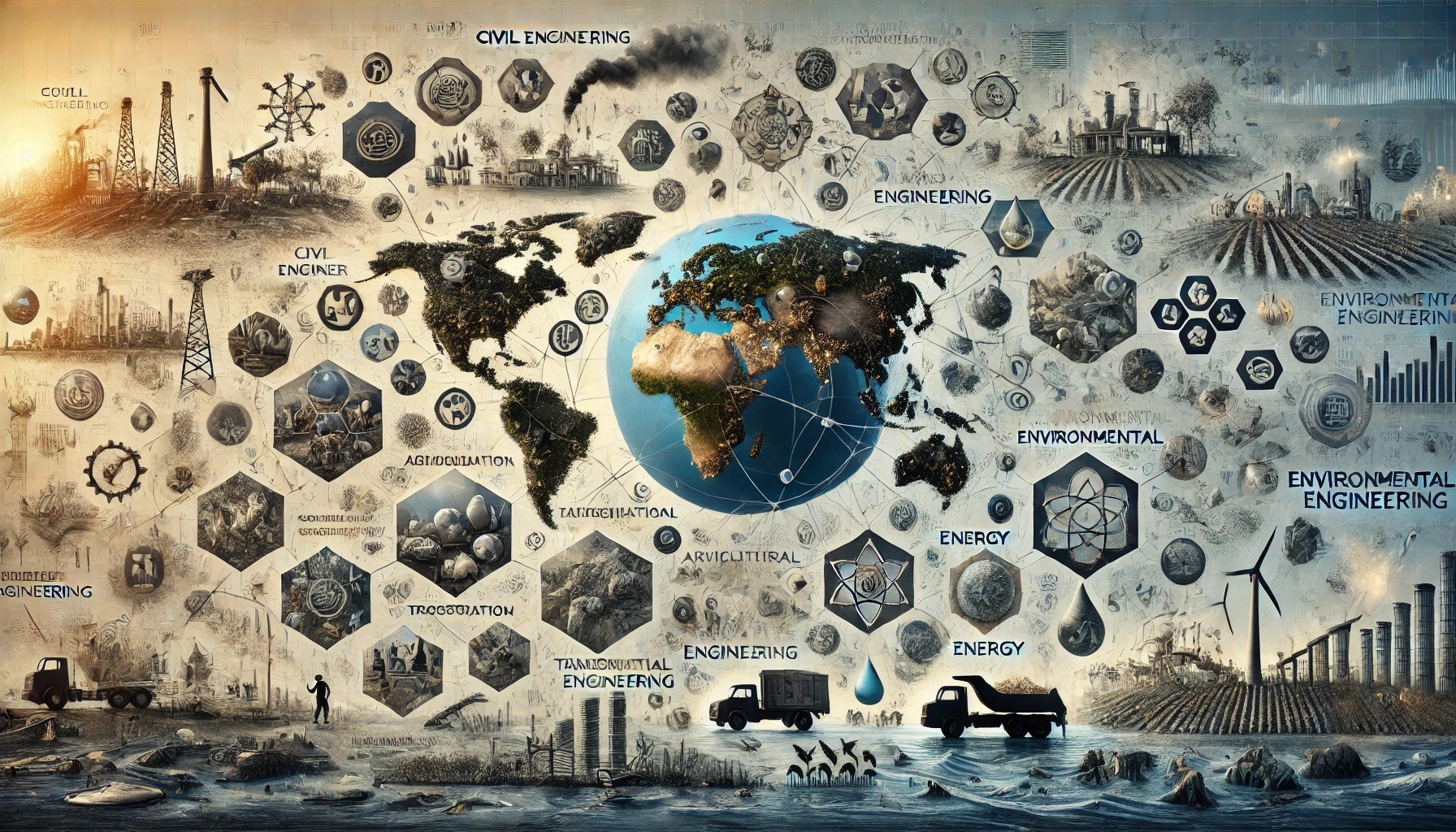
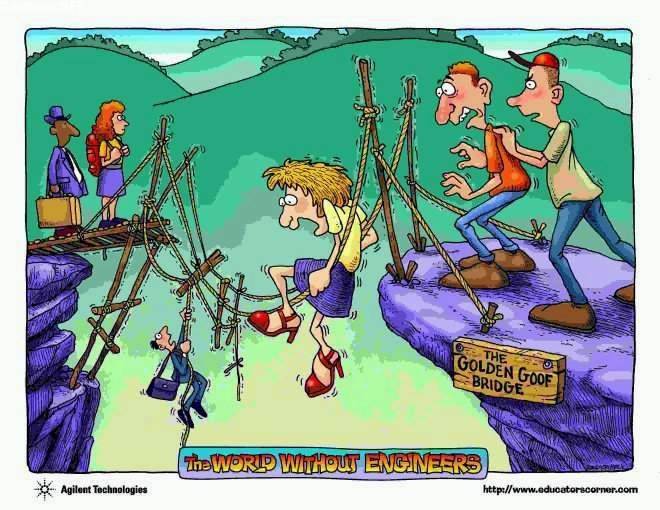
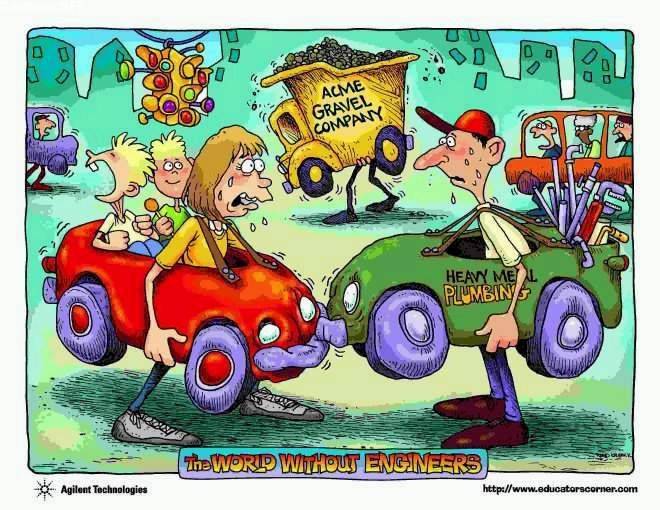
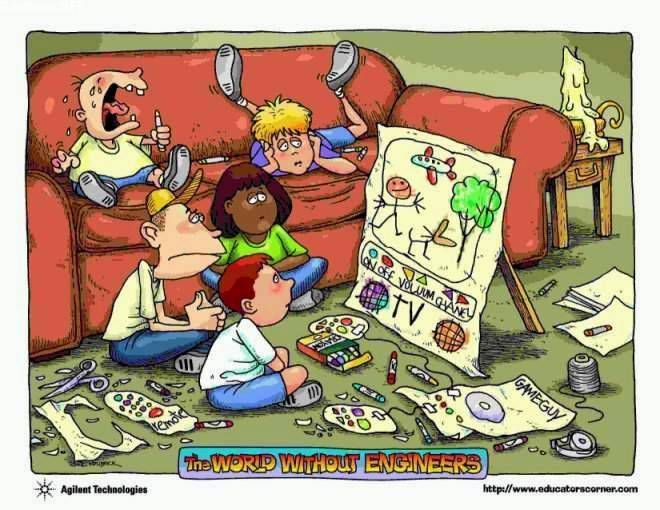
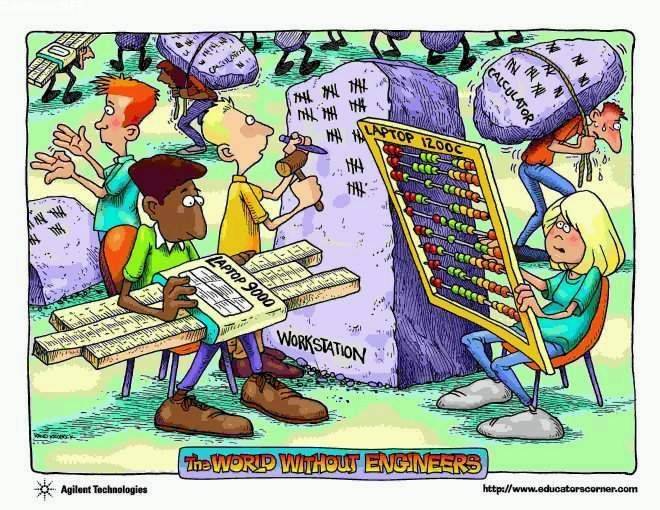
.jpeg)
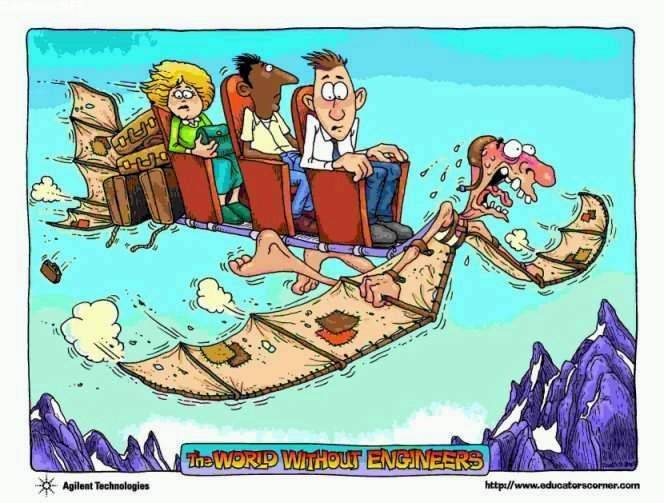
.jpeg)
.jpeg)
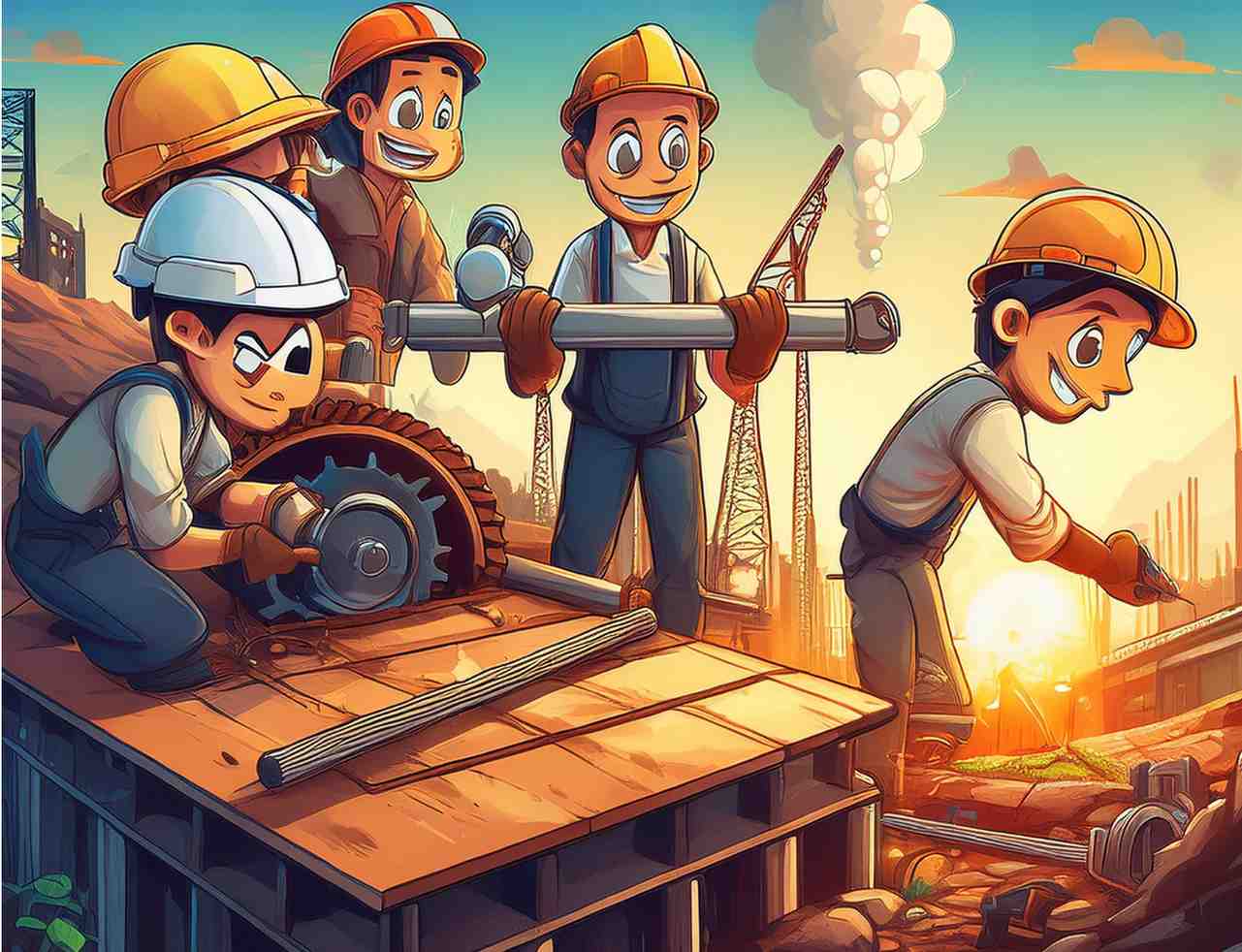
.jpeg)


.jpeg)
